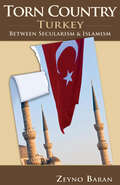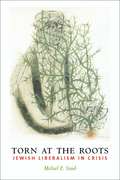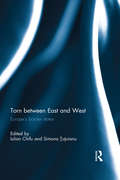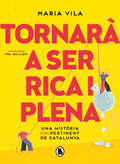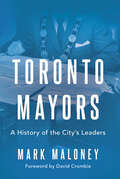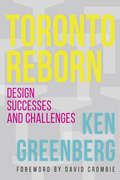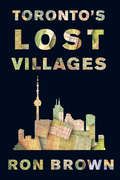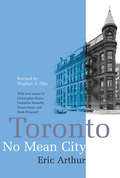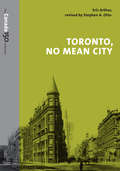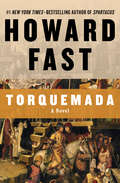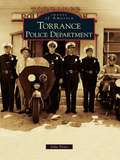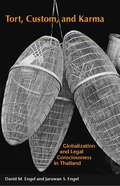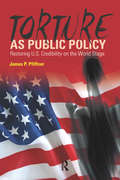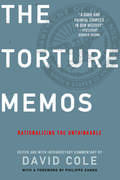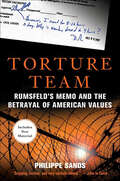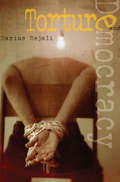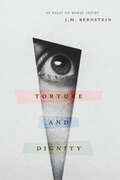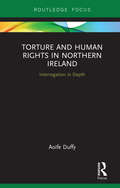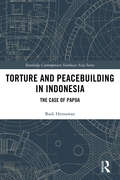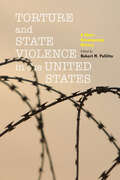- Table View
- List View
Torn Country: Turkey between Secularism and Islamism
by Zeyno BaranZeyno Baran examines the intense struggle between Turkey's secularists and Islamists in their most recent battles over their country's destination. Looking into the fate of both Turkey's secularism and its democratic experiment, she shows that, for all the flaws of its political journey, the modern Turkish state has managed to maintain an essential separation between religion and the political realm-a separation that is now in jeopardy.
Torn at the Roots: The Crisis of Jewish Liberalism in Postwar America (Religion and American Culture)
by Michael StaubWhen Jewish neoconservatives burst upon the political scene, many people were surprised. Conventional wisdom held that Jews were uniformly liberal. This book explodes the myth of a monolithic liberal Judaism. Michael Staub tells the story of the many fierce battles that raged in postwar America over what the authentically Jewish position ought to be on issues ranging from desegregation to Zionism, from Vietnam to gender relations, sexuality, and family life. Throughout the three decades after 1945, Michael Staub shows, American Jews debated the ways in which the political commitments of Jewish individuals and groups could or should be shaped by their Jewishness. Staub shows that, contrary to conventional wisdom, the liberal position was never the obvious winner in the contest.By the late 1960s left-wing Jews were often accused by their conservative counterparts of self-hatred or of being inadequately or improperly Jewish. They, in turn, insisted that right-wing Jews were deaf to the moral imperatives of both the Jewish prophetic tradition and Jewish historical experience, which obliged Jews to pursue social justice for the oppressed and the marginalized. Such declamations characterized disputes over a variety of topics: American anticommunism, activism on behalf of African American civil rights, imperatives of Jewish survival, Israel and Israeli-Palestinian relations, the 1960s counterculture, including the women's and gay and lesbian liberation movements, and the renaissance of Jewish ethnic pride and religious observance. Spanning these controversies, Staub presents not only a revelatory and clear-eyed prehistory of contemporary Jewish neoconservatism but also an important corrective to investigations of "identity politics" that have focused on interethnic contacts and conflicts while neglecting intraethnic ones. Revising standard assumptions about the timing of Holocaust awareness in postwar America, Staub charts how central arguments over the Holocaust's purported lessons were to intra-Jewish political conflict already in the first two decades after World War II. Revisiting forgotten artifacts of the postwar years, such as Jewish marriage manuals, satiric radical Zionist cartoons, and the 1970s sitcom about an intermarried couple entitled Bridget Loves Bernie, and incidents such as the firing of a Columbia University rabbi for supporting anti-Vietnam war protesters and the efforts of the Miami Beach Hotel Owners Association to cancel an African Methodist Episcopal Church convention, Torn at the Roots sheds new light on an era we thought we knew well.
Torn between East and West: Europe's border states
by Iulian Chifu Simona TutuianuThis book is a very timely account of the legal, economic and political consequences for border states caught in the current tug-of-war between the West and Russia.The Ukraine crisis of 2014 focused policy-makers’ attention on a geographical area full of dangers that had gone relatively unnoticed since the breakup of the Soviet Union, namely the security dynamics of the border states of Eastern Europe and the Black Sea. Twenty-five years after the collapse of the Soviet Union, a strong Russia returns alternatively threatening and cajoling, but at risk itself of suffering economic injury from western reprisals over its nostalgia for the map drawn at Yalta. That conflict, which hotted up over the Ukraine, was soon being played out over - and in the air space over - Syria and Turkey, while the border states themselves are likely to be drawn into the European refugee crisis and have the potential, after the 2015 Paris atrocities, to be breeding grounds for international terrorists. This groundbreaking book contains prescient warnings that must be heeded by leaders and diplomats on both sides of the East-West divide.
Tornarà a ser rica i plena: Una història (im)pertinent de Catalunya
by Maria VilaUna revisió il·lustrada de la història política, social i territorial de Catalunya des d'una mirada fresca, humorística i rigorosa. Si us plau, parlem clar d'una vegada: desmentim els tòpics folklòrics sobre la nostra terra. No sempre hem estat gent de pau ni uns triomfadors (més aviat el contrari, o bé només gent a qui ens agrada tenir raó). Però el que sí som és un poble que s'avança a la història -a vegades massa i tot-, una mena d'estat nació abans que existís l'estat nació, i tot això no es pot entendre sense el paper crucial de la llengua en què pensem. Aquest llibre intenta explicar de manera resumida i sense pèls a la llengua com Catalunya s'ha convertit en el que és ara. Una història de reines medievals que tallen el bacallà, reis traumatitzats que acaben convertint Catalunya en un imperi del Mediterrani, borbons repressors i, sobretot, la voluntat de resistir d'un país marcat per la tensió entre la incapacitat per alliberar-se d'Espanya i la falta de força de l'Estat per assimilar-lo. Amb il·lustracions de Pol Guillen
Toronto Mayors: A History of the City's Leaders
by Mark MaloneyThe first-ever look at all 65 Toronto mayors — the good, the bad, the colourful, the rogues, and the leaders — who have shaped the city.Toronto’s mayoral history is both rich and colourful. Spanning 19 decades and the growth of Toronto, from its origins as a dusty colonial outpost of just 9,200 residents to a global business centre and metropolis of some three million, this compendium provides fascinating biographical detail on each of the city’s mayors.Toronto’s mayors have been curious, eccentric, or offbeat; others have been rebellious, swaggering, or alcoholic. Some were bigots, bullies, refugees, war heroes, social crusaders, or bon vivants; still others were inspiring, forward looking, or well ahead of their time.One Toronto mayor attempted to kill a predecessor, but his pistol jammed. Another simply beat up the councillors he didn’t like. One committed murder, while another carried out a home invasion. And under the threat of capture and certain death, two mayors were forced to escape the city and live for years in exile, while another had 18 kids and cried poor, yet died on a luxury European vacation (minus the kids). One mayor was involved in the brutal torture of an opposition candidate. Another went insane while in office due to acute third stage syphilis.Each mayor is the inheritor of a rich legacy of hopes and dreams, ambitions and efforts, successes and failures. From the first mayor in 1834 — the firebrand rebel William Lyon Mackenzie — to those of the 21st century — Mel Lastman, David Miller, Rob Ford, and John Tory — Toronto Mayors looks at where each came from, how they came to lead the city, what issues they dealt with, and how they steered Toronto’s City Council.
Toronto Reborn: Design Successes and Challenges
by Ken GreenbergAn incisive view of Toronto’s development over the last fifty years. In Toronto Reborn, Ken Greenberg describes the emerging contours of a new Toronto. Focusing on the period from 1970 to the present, Greenberg looks at how the work and decisions of citizens, NGOs, businesses, and governments have combined to refashion Toronto. Individually and collectively, their actions — renovating buildings and neighbourhoods, building startling new structures and urban spaces, revitalizing old cultural institutions and creating new ones, sponsoring new festivals and events — have transformed the old postwar city, changing it into an exciting modern one.
Toronto the Good?: Negotiating Race in the Diverse City
by Shana AlmeidaArmed with the motto "Diversity Our Strength," the City of Toronto has garnered a world-class reputation for challenging racism, largely because of how it is seen to value and include racialized groups through its diversity policies and practices. Toronto the Good? unsettles popular depictions of both diversity and the City of Toronto by attending to what diversity does in and for the City in the context of historical relations of race. Toronto the Good? brings together Shana Almeida’s critical insights as a former political staff member along with her years of in-depth research on diversity in the City of Toronto to offer a compelling case to rethink how we understand diversity and racial inclusion in the City of Toronto and beyond. Initiated in a local context, Toronto the Good? critically contributes to global discussions on diversity, race, democracy, political participation, and power.
Toronto's Lost Villages
by Ron BrownExplore the vestiges of the hamlets and villages that have been swallowed up by Toronto’s relentless growth. Over the course of more than two centuries, Toronto has ballooned from a muddy collection of huts on a swampy waterfront to Canada’s largest and most diverse city. Amid (and sometimes underneath) this urban agglomeration are the remains of many small communities that once dotted the region now known as Toronto and the GTA. Before European settlers arrived, Indigenous Peoples established villages on the shore of Lake Ontario. With the arrival of the English, a host of farm hamlets, tollgate stopovers, mill towns, and, later, railway and cottage communities sprang up. Vestiges of some are still preserved, while others have disappeared forever. Some are remembered, though many have been forgotten. In Toronto’s Lost Villages, all of their stories are brought back to life.
Toronto, No Mean City
by Stephen Otto Eric ArthurEric Arthur fell in love with Toronto the first time he saw it. The year was 1923; he was twenty-five years old, newly arrived to teach architecture at the University of Toronto. For the next sixty years he dedicated himself to saving the great buildings of Toronto's past. Toronto, No Mean City sounded a clarion call in his crusade. First published in 1964, it sparked the preservation movement of the 1960s and 1970s and became its bible. This reprint of the third edition, prepared by Stephen Otto, updates Arthur's classic to include information and illustrations uncovered since the appearance of the first edition.Four new essays were commissioned for this reprint. Christopher Hume, architecture critic and urban affairs columnist for the Toronto Star, addresses the changes to the city since the appearance of the third edition in 1986. Architect and heritage preservation activist Catherine Nasmith assesses the current status of the city's heritage preservation movement. Susan Crean, a freelance writer in Toronto, explores Toronto's vibrant arts scene. Mark Kingwell, professor and cultural commentator, reflects on the development of professional and amateur sports in and around town.Readers will delight in these anecdotal accounts of the city's rich architectural heritage.
Toronto, No Mean City
by Stephen Otto Eric ArthurEric Arthur fell in love with Toronto the first time he saw it. The year was 1923; he was twenty-five years old, newly arrived to teach architecture at the University of Toronto. For the next sixty years he dedicated himself to saving the great buildings of Toronto's past. Toronto, No Mean City sounded a clarion call in his crusade. First published in 1964, it sparked the preservation movement of the 1960s and 1970s and became its bible. This reprint of the third edition, prepared by Stephen Otto, updates Arthur's classic to include information and illustrations uncovered since the appearance of the first edition.Four new essays were commissioned for this reprint. Christopher Hume, architecture critic and urban affairs columnist for the Toronto Star, addresses the changes to the city since the appearance of the third edition in 1986. Architect and heritage preservation activist Catherine Nasmith assesses the current status of the city's heritage preservation movement. Susan Crean, a freelance writer in Toronto, explores Toronto's vibrant arts scene. Mark Kingwell, professor and cultural commentator, reflects on the development of professional and amateur sports in and around town.Readers will delight in these anecdotal accounts of the city's rich architectural heritage.
Torquemada: A Novel
by Howard FastAn &“eerily successful&” novel of the fifteenth-century Grand Inquisitor of the Spanish Inquisition from the New York Times–bestselling author of Spartacus (Kirkus Reviews). Bestselling author Howard Fast&’s 1966 novelization of the Spanish Inquisition, Torquemada, is a terrifying drama about one of history&’s most notorious individuals. Prior Thomas de Torquemada and Don Alvaro de Rafel, a Spanish knight, have been friends for many years. But when Torquemada is named Spain&’s Grand Inquisitor by King Ferdinand and begins to hear whispers that Alvaro may have a secret Jewish past, he transforms from Alvaro&’s old friend into a menacing new enemy.Inspired by Fast&’s experiences being investigated by the House Un-American Activities Committee, and his subsequent jailing and blacklisting, Torquemada is a thrilling historical tale from a master of the genre. This ebook features an illustrated biography of Howard Fast including rare photos from the author&’s estate.
Torrance Police Department (Images of America)
by John R. PrinsThe Torrance Police Department dates to May 23, 1921, when city trustees appointed Ben Olsen as city marshal and, shortly thereafter, hired Byron Anderson as night watchman. The efforts of these men were devoted to dealing with thieves, keeping the peace, and "declaring war on speedsters." From such humble beginnings, the Torrance Police Department has grown into the fourth largest municipal law enforcement agency in Los Angeles County. Its position as the anchoring police force of the South Bay section of the county and its reputation as an innovator in crime fighting have been firmly established over time. Today, with a total of 242 sworn and 100 support personnel, the highly regarded Torrance Police Department serves more than 142,000 inhabitants in 21 square miles.
Torres de piedra
by Wojciech JagielskiUna impresionante crónica de Wojciech Jagielski sobre la guerra chechena. «En un mundo en guerra solo puedes ser partícipe, voluntario o involuntario. Es imposible permanecer como un mero investigador u observador.» Torres de piedra es un extraordinario reportaje de Wojciech Jagielski sobre uno de los lugares más trágicos y desconocidos del planeta: Chechenia. Los abundantes recursos petrolíferos y el derrumbe de la Unión Soviética en 1991 alimentaron las aspiraciones independentistas de la población chechena y desembocaron en dos sangrientas guerras contra Rusia que se saldaron con más de 150.000 muertos. Este libro retrata la segunda de ellas, iniciada en 1999 como maniobra política para asegurar la elección como presidente de Rusia de un entonces desconocido ex miembro del KGB: Vladímir Putin y cerrada en falso en 2002, con un gobierno títere incapaz de controlar las zonas rebeldes gobernadas por la ley del más fuerte. Jagielski retrata magistralmente Chechenia, sus habitantes y la cruel guerra sostenida por un puñado de guerrilleros desesperados contra el poderoso ejército ruso. Su narración se estructura en torno a los protagonistas principales del conflicto, dos hombres que se lo deben todo a esta guerra: Shamil Basáyev, héroe para algunos y peligroso señor de la guerra para otros, y Aslán Masjádov, un político soberbio y calculador, salvador providencial para una parte de sus compatriotas y cobarde oportunista para el resto. La guerra librada por ambos contra las fuerzas enemigas y sus irresolubles conflictos proporcionan al autor un valiosísimo material sobre el que construir una espléndida y conmovedora alegoría acerca de la guerra y la irreversibilidad de las buenas y malas elecciones. Reseñas:«Este libro de Jagielski alcanza un nuevo nivel en el grupo de descarnadas crónicas sobre uno de los rincones más olvidados de la antigua Rusia y sobre los espantosos daños infligidos a los chechenos tanto por los líderes extranjeros como por los autóctonos. En este relato, las miserias, desgracias y peligros de la cotidianeidad chechena cobran vida con una claridad insoportable.»The Economist «Los reportajes de Wojciech Jagielski ya han sido muy elogiados. Su trabajo más reciente confirmará esa reputación.»Ryszard Kapuscinski
Tort, Custom, and Karma: Globalization and Legal Consciousness in Thailand
by David Engel Jaruwan S. EngelDavid (law) and Jaruwan (Thai language, both State U. of New York-Buffalo) first conducted research in the Chiangmai region beginning in 1975 that yielded a 1978 book on law and society in Thailand. They returned in 1990, and much of this present work is concerned with how the role of law to injury cases had declined during the 15 year interval. They discuss Buajan's injury narrative, a history of globalizations in Chaingmai, state law and the law of sacred centers, injury practices in a transformed society, litigation, justice, and Ming's injury narrative. Annotation ©2010 Book News, Inc. , Portland, OR (booknews. com)
Torture (The\middle Ages Ser.)
by Edward Peters"Torture has ceased to exist," Victor Hugo claimed, with some justification, in 1874. Yet more than a century later, torture is used routinely in one out of every three countries. This book is about torture in Western society from earliest times to the present.A landmark study since its original publication a decade ago, Torture is now available in an expanded and updated paperback edition. Included for the first time is a broad and disturbing selection of documents charting the historical practice of torture from the ancient Romans to the Khmer Rouge.
Torture As Public Policy: Restoring U.S. Credibility on the World Stage
by James P. PfiffnerAfter September 11, 2001 the Bush Administration decided that the most important intelligence about terrorism would come from the interrogation of captives suspected of terrorism. As a result, many detainees were subject to harsh interrogation techniques that at times amounted to torture. Here, James P. Pfiffner authoritatively examines the policy directives, operational decisions, and leadership actions of the Bush Administration that reversed centuries of US policy on the treatment of enemy prisoners. He shows how the serious reservations of career military lawyers about these policies were overcome by the political appointees of the Bush Administration. Pfiffner then analyses the philosophical and legal underpinnings of the policies and practices that have led to the denunciation of the United States' policies by its allies and adversaries throughout the world. Looking ahead, Pfiffner anticipates Obama administration policy changes to restore U.S. credibility and accountability. In all, Torture as Public Policy is a model of detailed policy analysis that demonstrates how greatly public policy matters beyond the back corridors of bureaucracy.
Torture Memos
by David ColeOn April 16, 2009, the Justice Department released never-before-seen secret memos describing, in graphic detail, the brutal interrogation techniques used by the CIA under the Bush administration's "war on terror." Now, for the first time, the key documents are compiled in one remarkable volume, showing that the United States government's top attorneys were instrumental in rationalizing acts of torture and cruelty, employing chillingly twisted logic and Orwellian reasoning to authorize what the law absolutely forbids.This collection gives readers an unfiltered look at the tactics approved for use in the CIA's secret overseas prisons--including forcing detainees to stay awake for eleven days straight, slamming them against walls, stripping them naked, locking them in a small box with insects to manipulate their fears, and, of course, waterboarding--and at the incredible arguments advanced to give them a green light. Originally issued in secret by the Office of Legal Counsel between 2002 and 2005, the documents collected here have been edited only to eliminate repetition. They reflect, in their own words, the analysis that guided the legal architects of the Bush administration's interrogation policies.Renowned legal scholar David Cole's introductory essay tells the story behind the memos, and presents a compelling case that instead of demanding that the CIA conform its conduct to the law, the nation's top lawyers contorted the law to conform to the CIA's abusive and patently illegal conduct. He argues eloquently that official accountability for these legal wrongs is essential if the United States is to restore fidelity to the rule of law.
Torture Team: Rumsfeld's Memo and the Betrayal of American Values
by Philippe SandsThe shocking revelations of the men and women who adopted and enforced Rumsfeld's 2002 memo that paved the way for the inhuman interrogation practices at Guantanamo and Abu Ghraib.On December 2, 2002 the U.S. Secretary of Defense, Donald Rumsfeld, signed his name at the bottom of a document that listed eighteen techniques of interrogation--techniques that defied international definitions of torture. The Rumsfeld Memo authorized the controversial interrogation practices that later migrated to Guantanamo, Afghanistan, Abu Ghraib and elsewhere, as part of the policy of extraordinary rendition. From a behind-the-scenes vantage point, Phillipe Sands investigates how the Rumsfeld Memo set the stage for a divergence from the Geneva Convention and the Torture Convention and holds the individual gatekeepers in the Bush administration accountable for their failure to safeguard international law. The Torture Team delves deep into the Bush administration to reveal:- How the policy of abuse originated with Donald Rumsfeld, Dick Cheney and George W. Bush, and was promoted by their most senior lawyers- Personal accounts, through interview, of those most closely involved in the decisions- How the Joint Chiefs and normal military decision-making processes were circumvented- How Fox TV's 24 contributed to torture planning- How interrogation techniques were approved for use - How the new techniques were used on Mohammed Al Qahtani, alleged to be "the 20th highjacker" - How the senior lawyers who crafted the policy of abuse exposed themselves to the risk of war crimes charges
Torture and Democracy
by Darius RejaliThis is the most comprehensive, and most comprehensively chilling, study of modern torture yet written. Darius Rejali, one of the world's leading experts on torture, takes the reader from the late nineteenth century to the aftermath of Abu Ghraib, from slavery and the electric chair to electrotorture in American inner cities, and from French and British colonial prison cells and the Spanish-American War to the fields of Vietnam, the wars of the Middle East, and the new democracies of Latin America and Europe. As Rejali traces the development and application of one torture technique after another in these settings, he reaches startling conclusions. As the twentieth century progressed, he argues, democracies not only tortured, but set the international pace for torture. Dictatorships may have tortured more, and more indiscriminately, but the United States, Britain, and France pioneered and exported techniques that have become the lingua franca of modern torture: methods that leave no marks. Under the watchful eyes of reporters and human rights activists, low-level authorities in the world's oldest democracies were the first to learn that to scar a victim was to advertise iniquity and invite scandal. Long before the CIA even existed, police and soldiers turned instead to "clean" techniques, such as torture by electricity, ice, water, noise, drugs, and stress positions. As democracy and human rights spread after World War II, so too did these methods. Rejali makes this troubling case in fluid, arresting prose and on the basis of unprecedented research--conducted in multiple languages and on several continents--begun years before most of us had ever heard of Osama bin Laden or Abu Ghraib. The author of a major study of Iranian torture, Rejali also tackles the controversial question of whether torture really works, answering the new apologists for torture point by point. A brave and disturbing book, this is the benchmark against which all future studies of modern torture will be measured.
Torture and Dignity: An Essay on Moral Injury
by J. M. BernsteinIn this unflinching look at the experience of suffering and one of its greatest manifestations--torture--J. M. Bernstein critiques the repressions of traditional moral theory, showing that our morals are not immutable ideals but fragile constructions that depend on our experience of suffering itself. Morals, Bernstein argues, not only guide our conduct but also express the depth of mutual dependence that we share as vulnerable and injurable individuals. Beginning with the attempts to abolish torture in the eighteenth century, and then sensitively examining what is suffered in torture and related transgressions, such as rape, Bernstein elaborates a powerful new conception of moral injury. Crucially, he shows, moral injury always involves an injury to the status of an individual as a person--it is a violent assault against his or her dignity. Elaborating on this critical element of moral injury, he demonstrates that the mutual recognitions of trust form the invisible substance of our moral lives, that dignity is a fragile social possession, and that the perspective of ourselves as potential victims is an ineliminable feature of everyday moral experience.
Torture and Human Rights in Northern Ireland: Interrogation in Depth
by Aoife DuffyThis book presents a compelling and highly sophisticated politico-legal history of a particular security operation that resulted in one of the most high-profile torture cases in the world. It reveals the extent to which the Ireland v. United Kingdom judgment misrepresents the interrogation system that was developed and utilised in Northern Ireland. Finally, the truth about the operation is presented in a comprehensive narrative, sometimes corroborating secondary literature already in the public domain, but at other times significantly debunking aphorisms, or, indeed, lies that circulated about interrogation in depth. The book sets out the theoretical reference paradigm with respect to the culture and practice of state denial often associated with torture, and uses this model to excavate the buried aspects of this most famous of torture cases. Through the lens of a single operation, conducted twice, it presents a fascinating exposé of the complicated structures of state-sponsored denial designed to hide the truth about the long-term effects of these techniques and the way in which they were authorised.
Torture and Peacebuilding in Indonesia: The Case of Papua (Routledge Contemporary Southeast Asia Series)
by Budi HernawanState-sponsored torture and peacebuilding encapsulate the essence of many of the current conflicts in Indonesia. Papua in particular provides a thought-provoking example of the intricacy and complexity of building peace amidst enduring conflict and violence. This book examines the complex power relations that have constructed the gruesome picture of the fifty-year practice of torture in Papua, as well as the ongoing Papuan peacebuilding movements that resist the domineering power of the Indonesian state over Papuans. Conceptualising ‘theatres of torture and peace’, the book argues that torture in Papua is performed in public by the Indonesian state in order to communicate its policy of terror towards Papuans - it is not meant for extracting information, gaining confessions or exacting punishment. A Torture Dataset is provided, codifying evidence from a broad range of cases, collected through sensitive interviews. In examining the data, the author crafts a new, more holistic framework for analyzing cases of torture and employs an interdisciplinary approach integrating three different theories: Foucault’s theory of governmentality and sovereignty, Kristeva’s theory of abjection and Metz’s theory of memoria passionis (the memory of suffering). The book successfully establishes a new understanding of torture as ‘public theatre’ and offers a new perspective of strengthening the existing Papuan peacebuilding framework of Papua Land of Peace. It will be of interest to academics working on Southeast Asian Studies, Peace and Conflict Studies, Transitional Justice, Peacebuilding, Human Rights and Anthropology of Violence.
Torture and State Violence in the United States: A Short Documentary History
by Robert M. PallittoThe war on terror has brought to light troubling actions by the United States government which many claim amount to torture. But as this book shows, state-sanctioned violence and degrading, cruel, and unusual punishments have a long and contentious history in the nation. Organized around five broad thematic periods in American history—colonial America and the early republic; slavery and the frontier; imperialism, Jim Crow, and World Wars I and II; the Cold War, Vietnam, and police torture; and the war on terror—this annotated documentary history traces the low and high points of official attitudes toward state violence. Robert M. Pallitto provides a critical introduction, historical context, and brief commentary and then lets the documents speak for themselves. The result is a nearly 400-year history that traces the continuities and changes in debates over the meaning of torture and state violence in the U.S. and shows where state actions and policies have pushed and exceeded constitutional and international normative limits. Rigorously researched—and sometimes chilling—this volume is the first comprehensive reference work on state violence and torture in the U.S.
Torture in the National Security Imagination
by Stephanie AtheyReassessing the role of torture in the context of police violence, mass incarceration, and racial capitalism At the midpoint of a century of imperial expansion, marked on one end by the Philippine–American War of 1899–1902 and on the other by post–9/11 debates over waterboarding, the United States embraced a vision of &“national security torture,&” one contrived to cut ties with domestic torture and mass racial terror and to promote torture instead as a minimalist interrogation tool. Torture in the National Security Imagination argues that dispelling this vision requires a new set of questions about the everyday work that torture does for U.S. society. Stephanie Athey describes the role of torture in the proliferation of a U.S. national security stance and imagination: as U.S. domestic tortures were refined in the Philippines at the turn of the twentieth century, then in mid-century counterinsurgency theory and the networks that brought it home in the form of law-and-order policing and mass incarceration. Drawing on examples from news to military reports, legal writing, and activist media, Athey shows that torture must be seen as a colonial legacy with a corporate future, highlighting the centrality of torture to the American empire—including its role in colonial settlement, American Indian boarding schools, and police violence. She brings to the fore the spectators and commentators, the communal energy of violence, and the teams and target groups necessary to a mass undertaking (equipment suppliers, contractors, bureaucrats, university researchers, and profiteers) to demonstrate that, at base, torture is propelled by local social functions, conducted by networked professional collaborations, and publicly supported by a durable social imaginary.
Torture, Power, and Law
by David LubanThis volume brings together the most important writing on torture and the 'war on terror by one of the leading US voices in the torture debate. Philosopher and legal ethicist David Luban reflects on this contentious topic in a powerful sequence of essays including two new and previously unpublished pieces. He analyzes the trade-offs between security and human rights, as well as the connection between torture, humiliation, and human dignity, the fallacy of using ticking bomb scenarios in debates about torture, and the ethics of government lawyers. The book develops an illuminating and novel conception of torture as the use of pain and suffering to communicate absolute dominance over the victim. Factually stimulating and legally informed, this volume provides the clearest analysis to date of the torture debate. It brings the story up to date by discussing the Obama administration's failure to hold torturers accountable.
